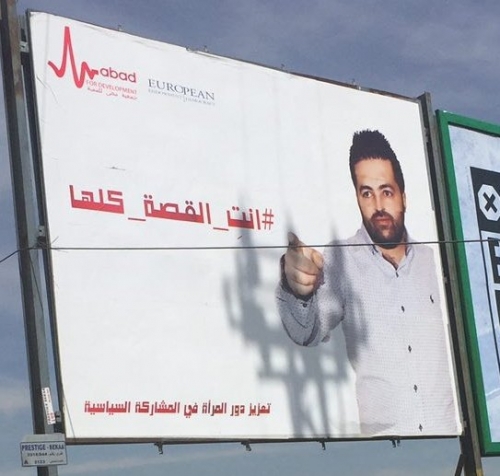
We are surprised that three provinces are going to an election this Sunday. Perhaps our surprise is the only thing we could have predicted correctly in the last few months. In the midst of such hurry to react to a sudden promise of democracy, we forget that hurried elections are inherently undemocratic. But maybe not in a country where whiplash is the norm of participation in public affairs.
The gender take on these elections has been all about women running for municipal seats. Women’s empowerment billboards have mushroomed from Beirut to Bekaa. NGOs are training and supporting hundreds of women to get on the ballot. It is very likely that the number of women on municipal councils will double from its 4% in 2010. Progress, but not enough, the NGOs will say, measuring our political participation in development terms of women holding elected office. It is a good thing to have more women in baladiyis. But it doesn’t come close to solving the actual problem.
There has been very little discussion of the larger questions around these municipal elections, partly because there’s been no time to think and partly because we’re distracted by the fact that independent seculars have a decent chance of winning in Beirut. But we would be remiss not to offer a deeper feminist analysis into how municipal elections are designed to keep women out of public life. We start at the root of the problem: ikhraj el qayd.
We are registered as citizens of Lebanon as entries that are tagged in 3 ways:
-
The name of the town
-
A religious confession
-
A number for each family folder
These 3 tags constitute together the code of the folder in which your personal registration as a Lebanese citizen sits. In contrast to having serial numbers given to each citizen (like your passport number), your actual citizenship is determined by the folder you are born into. Here is an illustration:
This is where your citizenship site, as a person belonging to this nation state of Lebanon. As long as this is our registry system, we are forever bound to our religious confession. Shatb el tayfi, while well-intentioned a statement, does not remove you from the folder. Your name can’t be on a post-it note that sits in the box. The system is strictly organized as names on papers in folders. When you ask your mokhtar (an outdated role that exists only because of this system) for an ikhraj qayd - that’s literally what he does: he extracts your name from the registry (in the folder in the box) and presents you with an “extraction of registry” for an individual or for a nuclear family.
I want to add here that the only time women as a group are separated from the registry is to create laweyi7 el shatb, so that polling stations are divided by gender: rooms for men and rooms for women. There is probably some patriarchal tradition for why women and men don’t vote in the same rooms. Otherwise, women sit in their father’s or husband’s qayd (what a pun).
There is much to be written about this system of classification of Lebanese citizens and the fascinating ramifications it has had on every single aspect of private and public lives. But, for now, let us take a closer look at women within this system. All the examples I use below are screenshots from the Ministry of Interior’s laweyi7 shatb, which were available online on the المديرية العامة للأحوال الشخصية website for a month so that citizens can check for mistakes. I spent about 300 hours looking at the data which has now been taken down.
Women are born into a family and added to its registry under its classification number. Like men, their registration as citizens cannot exist outside of this classification. When a woman marries a man, her name is deleted from her family’s registry and moved to her husband’s registry. Here is an example:
And so, literally, a note is made that the woman has been moved by marriage from one folder in one box to another folder in another box - always tied to a man’s folder and thus to his religion. Note, however, that she maintains her previous religious confession in the mazhab column, but this has no impact on her legal citizenship, which is determined by the religion on her husband’s folder. Look at this example of all the various confessions of women (i.e. the religion of their fathers’ folders) who were moved by marriage to the Syriac Catholic folder in Zahle:
This is further indication that one’s personal confession (or lack thereof) does not matter. What matters is the religion used to identify the folder. That is what constitutes one’s legal status vis-a-vis qanoun al a7wal al shakhsiyya.
Additionally, women can only exist in the registry as daughters of men or wives of men. When they get a divorce, they cannot stay in their husband’s registry; they must be moved back. And so a note is added in quite demeaning language to document that a woman has been “returned” from the husband’s registry to the father’s.
Abolishing this entire Lebanese citizen classification system is key to the liberation of women. It explains much of the bureaucratic impossibility of women’s rights in Lebanon. For example, the question of passing on nationality: how is a woman supposed to bring her non-Lebanese husband into this system? Can they open a new folder for this man using his religion? Do they add him under the woman’s family’s folder? Will that mean that other men can then be moved to their wives’ folders? Lebanese women married to non-Lebanese men remain in their father’s folder. This helps explain why there are more women than men in laweyi7 el shatb of over 90% of the Lebanese villages: because foreign women are added into the family registries while foreign men are not. In Achrafieh, for example, 55.86% of the citizens are women.
The political control of Lebanese citizens as members of religious confessions (not members of a state) is entrenched in the very classification system of the Lebanese registry. The only way to secularism in Lebanon is to abolish it all and replace it with a standard numerical registry. It is a deeply patriarchal system in that men control women’s placement in these folders and women cannot exist as citizens outside of their relationship to their fathers or husbands.
Now, moving on to the municipal elections.
Suppose a woman from Nabatieh moves to Beirut for work and lives there for 10 years. She cannot vote for the Beirut municipality, where she pays her taxes and fights her daily battles, etc. This is the same for men and is a serious problem that needs to be changed so that people register and vote where they live. On top of this, say she marries a man who is originally from Baalbak but also lives in Beirut. Now, not only can she not vote in Beirut (where she lives) or in Nabatieh (where she’s from) but she is expected to vote for the Municipality of Baalbak. And so, many women are double-detached from their municipalities’ councils. When people complain that women follow their husbands’ instructions on who to vote for, they forget that this electoral law is designed for women to follow their husbands’ registry. How then are they not supposed to follow their husbands’ political preferences?
Therefore, abolishing the municipality election law and replacing it with a law where you register and vote in the municipality where you actually live is not just an issue of democratic reform, but an issue of women’s political rights. And still, it is not enough. Under the current a7wel shakhsiyya system, only families would be able to move their qayd to where they live. Single women would not be able to move alone. And so, in conclusion, we must aim our radical struggle at abolishing the entire citizenship classification system. Only then will women’s votes be freed from the patriarchal control of an archaic bureaucracy.
Publisher:
Section:
Category:






